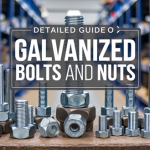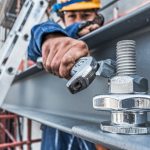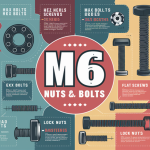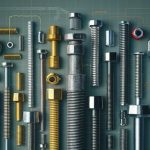The Fundamentals of Hex bolts
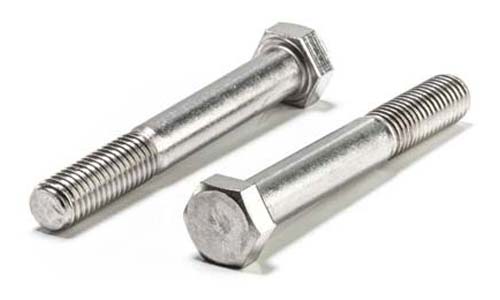
Hex bolts are threaded machine bolts that are used in tapped holes or with nuts. They are also referred to as hexagonal head bolts. Fundamental Hex bolts, as the name implies, are hexagon-shaped bolts with six sides that are composed of grade 2 galvanized steel, grade 316/304 stainless steel, and grade 5 zinc-plated steel. Hex bolts require holding with a wrench or socket because they spin when you tighten and loosen them, allowing for more torque than conventional circular screws. Socket wrenches are typically used for the installation and removal of hex bolts.
Why Do We Use Hex Bolts?
Because of their adaptability and versatility, hex head bolts may be used in various sectors and applications. Hex Bolts Suppliers offers head screws for wood, metal, and a variety of other settings and situations are a few examples of applications for hex bolts. Strong tensile qualities are provided, and depending on the material and finish, the majority of conventional types can be utilized in a variety of settings. Hex bolts are a commonly utilized staple fastener as a result.
Hex head bolts are intended to provide a non-loosening hold on things that are positioned inside or against other objects. They are used to fix steel to steel, wood to wood, and other materials that are used in construction projects like bridges, buildings, and highway infrastructure.
Heavy-duty fitting and fastening applications are their main use.
- In building projects
- When constructing, repairing, and maintaining roads, buildings, and bridges, machinery assemblies
- Doing woodworking projects like attaching frames
- Applications in engineering
- Automobile and Vehicle
Read Also: From Ground Up: Crafting Reliable Foundation Bolts for Your Projects
How Do Hex Bolts Function?
Depending on the software, fundamentals of hex bolts can be used with nuts or in pre-tapped holes. A form of gear, which includes socket units, a hex bolt wrench, hex keys, spanners, and ratchet spanners, can then be used to tighten them.
The hexagon-shaped head makes it simple to grasp hex bolts with various tool types and from a variety of angles. This ensures that it is simple to tighten or loosen hex bolts when they are in place and simplifies the process of installing and removing them.
Types of Hex Bolts
Hex bolts are available in various types, every ideally suited to a specific use and putting. Hex bolts can be divided into several classes, based totally on their size, the sort of fabric or finish used all through production, and whether or not or not they’re absolutely or partially threaded.
There are two types of hexagon head bolts: completely threaded and partially threaded. A fully threaded hex head bolt is utilized when matched to a completely threaded hole. Whenever force is exerted on the structure being secured, partially threaded bolts can withstand higher force because they are stiffer and have an unthreaded space beneath their head.
To help you make an informed purchasing decision, the following sections go into additional information about some of the most common varieties of hex bolts to get from Hex bolt suppliers.
Hex Bolt Threading
The helical helix that makes up the bolt’s main body is called the thread, sometimes referred to as the screw thread on hex head bolts. The bolt is driven firmly and securely into the material using rotating force, which also adds grip and facilitates simpler entry and removal.
Hex bolts with partial threading
Hex bolts with partial threading are only threaded from the halfway point to the end of the bolt. The head is joined to the threaded shank with an unthreaded shank. Bolts with partial threading offer high levels of resistance.
Hex bolts with full threads
Fully threaded hex bolts have threads as much as the head of the bolt. They work great when installed in pre-threaded holes and are perfect to be used in heavy-obligation fastening applications. Fully-threaded hex bolts, when fitted correctly, distribute pressure along the entire bolt length, offering more strength than partially-threaded counterparts.
Materials for Hex Bolts
The materials used to make hex bolts are usually steel or stainless steel. Hex bolts produced from steel or stainless steel are the maximum not unusual kind, whereas some manufacturers additionally provide hexagonal bolts manufactured of other substances. Furthermore, a variety of treatments and coatings are offered. To accommodate a broad range of applications, these offer a variety of characteristics and looks.
Popular hex bolt finishes include:
- Bright zinc-plated
- Zinc hex bolt
- Black oxide
- Clear passivated
- Plain
- Steel Hex Bolts
Steel Hex Bolts
Steel comes in many grades and strengths; EN8 and EN16 steel are common specifications for steel hex bolts. The stronger the steel, the higher the number.
All-Stainless Hex Bolts
Since stainless steel has excellent corrosion resistance, it’s also a famous desire for hex bolts. Zinc-plated metal is a famous replacement this is ideal for indoor use, even though chrome steel hex bolts may be used outside as nicely.
Hex bolts Made of Brass
Though less common, hex bolts constructed of other materials, such as brass, are also possible to find. Despite having a high level of corrosion resistance, brass is typically more expensive than steel, which is why steel is preferred.
Hex Bolt Dimensions
When measuring hex bolt dimensions and sizes, there are a few things to keep in mind to selecting the appropriate size for your work. Global adoption of the ISO metric thread size system is widespread. It is a useful global standard for gauging thread diameters in a variety of screw and bolt configurations. The letter “M” is used to represent each size, followed by a number. This figure represents the thread’s outside diameter in millimeters.
These are listed in the following order:
- The bolt’s length (measured from the end to just below the head)
- Thread size: the thread’s diameter, usually measured in M- or ISO-style units.
- Finer bolts have more threads every inch and the thread pitch is higher too.
Conclusion
Purchase the best Hex bolts from reputable and genuine Hex bolts suppliers. A range of fasteners, such as plastic, industrial, mil-spec, metric, stainless steel, and high strength fasteners, will be available to you. Hex bolts from reliable manufacturers come in a wide range of robust, reasonably priced, and high-quality options.
Read Also:

